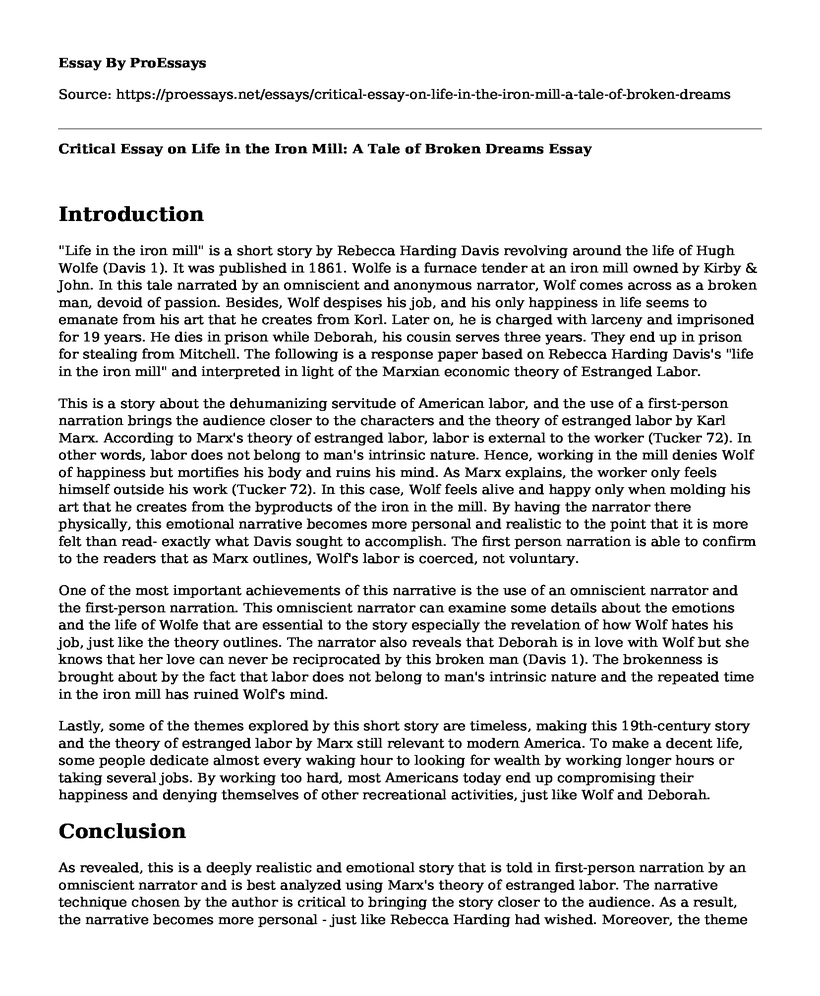Introduction
"Life in the iron mill" is a short story by Rebecca Harding Davis revolving around the life of Hugh Wolfe (Davis 1). It was published in 1861. Wolfe is a furnace tender at an iron mill owned by Kirby & John. In this tale narrated by an omniscient and anonymous narrator, Wolf comes across as a broken man, devoid of passion. Besides, Wolf despises his job, and his only happiness in life seems to emanate from his art that he creates from Korl. Later on, he is charged with larceny and imprisoned for 19 years. He dies in prison while Deborah, his cousin serves three years. They end up in prison for stealing from Mitchell. The following is a response paper based on Rebecca Harding Davis's "life in the iron mill" and interpreted in light of the Marxian economic theory of Estranged Labor.
This is a story about the dehumanizing servitude of American labor, and the use of a first-person narration brings the audience closer to the characters and the theory of estranged labor by Karl Marx. According to Marx's theory of estranged labor, labor is external to the worker (Tucker 72). In other words, labor does not belong to man's intrinsic nature. Hence, working in the mill denies Wolf of happiness but mortifies his body and ruins his mind. As Marx explains, the worker only feels himself outside his work (Tucker 72). In this case, Wolf feels alive and happy only when molding his art that he creates from the byproducts of the iron in the mill. By having the narrator there physically, this emotional narrative becomes more personal and realistic to the point that it is more felt than read- exactly what Davis sought to accomplish. The first person narration is able to confirm to the readers that as Marx outlines, Wolf's labor is coerced, not voluntary.
One of the most important achievements of this narrative is the use of an omniscient narrator and the first-person narration. This omniscient narrator can examine some details about the emotions and the life of Wolfe that are essential to the story especially the revelation of how Wolf hates his job, just like the theory outlines. The narrator also reveals that Deborah is in love with Wolf but she knows that her love can never be reciprocated by this broken man (Davis 1). The brokenness is brought about by the fact that labor does not belong to man's intrinsic nature and the repeated time in the iron mill has ruined Wolf's mind.
Lastly, some of the themes explored by this short story are timeless, making this 19th-century story and the theory of estranged labor by Marx still relevant to modern America. To make a decent life, some people dedicate almost every waking hour to looking for wealth by working longer hours or taking several jobs. By working too hard, most Americans today end up compromising their happiness and denying themselves of other recreational activities, just like Wolf and Deborah.
Conclusion
As revealed, this is a deeply realistic and emotional story that is told in first-person narration by an omniscient narrator and is best analyzed using Marx's theory of estranged labor. The narrative technique chosen by the author is critical to bringing the story closer to the audience. As a result, the narrative becomes more personal - just like Rebecca Harding had wished. Moreover, the theme of working-class enslavement is still relevant to contemporary America, making this story timeless.
Work Cited
Davis, Rebecca Harding. "Life in the Iron Mills." The Atlantic Apr 1861. www.theatlantic.com/magazine/archive/1861/04/life-in-the-iron-mills/304543/.
Tucker, C Robert. The Marx-Engels Reader. New York: Norton, 1972. Print.
Cite this page
Critical Essay on Life in the Iron Mill: A Tale of Broken Dreams. (2023, Mar 29). Retrieved from https://proessays.net/essays/critical-essay-on-life-in-the-iron-mill-a-tale-of-broken-dreams
If you are the original author of this essay and no longer wish to have it published on the ProEssays website, please click below to request its removal:
- Tom Jones Novel Essay
- Edgar Poe's, His Work and the Influence on the Literary World
- Albert Schweitzer Quotes Paper Example
- The Fall of the House of Usher Chapter One Passage Analysis Essay
- Essay Example on Lottery vs Rocking-Horse: Comparing Two Classics
- Brave New World: Individualism vs. Collectivism - Essay Sample
- Descriptive Language in Poetry: Enhancing Meaning and Aesthetics - Essay Sample







